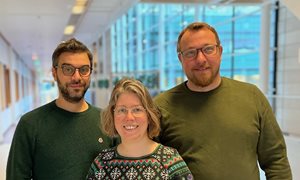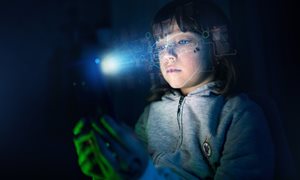
As many as four completely new AI labs will start within Radboud university medical center with a total funding of 16 million euros from NWO and companies. The labs will develop AI for accurate risk assessment of a narrowed coronary artery, better detection and treatment of prostate cancer, measurements at home of symptoms of Parkinson's disease and automation in the analysis of scans for lung cancer.
The four new labs are part of the ROBUST project, led by the UvA. In total, the project includes seventeen new labs with a budget of 87 million euros. The new labs all receive funding for a researcher, ten PhD students and support. The grant comes from the Dutch Research Council (NWO) and companies within a new NWO funding program: the long-term program (LTP). With this program, NWO provides a powerful stimulus to the development of a scientific field and ensures structural cooperation between public and private parties and knowledge institutions.
Bram van Ginneken, professor of AI, is leading the research at Radboudumc: 'This project is unique because of its size and long duration of ten years. Thanks to our top research at the Radboudumc, linked to the power of companies, we can build an even stronger AI ecosystem. This is also an excellent opportunity for the four researchers who will be directing the labs with us.' The next four projects are starting now:
To place or not to place a stent?
Technical physician Jos Thannhauser of the Department of Cardiology leads the CARA lab, the Cardiology lab with Abbott, Radboudumc and Amsterdam UMC. These centers want to predict whether a narrowing in a coronary artery will cause a heart attack. 'Whether we place a stent for such a narrowing is a big dilemma for cardiologists', Thannhauser says. 'They want to prevent a future heart attack, but not treat patients unnecessarily.' The imaging technique optical coherence tomography (OCT) will help to solve this dilemma. In OCT, a small camera moves through the coronary artery and takes hundreds of images. Thannhauser: 'A human being cannot possibly recognize patterns in such a large amount of information, let alone make the link with the risk of a heart attack. A computer, however, can learn this using AI algorithms.' These algorithms should provide treatment advice immediately after taking OCT images.
MRI scans in prostate cancer
Henkjan Huisman, professor of Medical Imaging AI in the Department of Medical Imaging, will direct the Healthy AI lab, a collaboration with the University of Groningen, University of Twente and Siemens Healthineers. This lab will develop and implement new applications of AI for better detection and treatment of prostate cancer. Huisman: 'For example, we are going to build AI into MRI scanners to make them more efficient. The AI algorithms in the scanner will determine already after taking a few images whether the risk of cancer is extremely small, which will be the case in a large group of patients. In that case, the scan stops early, making care faster and cheaper. If the algorithms are in doubt, we will take more images. That prevents unnecessary biopsies and gives better targeted treatments. Unique to this project is that AI is efficiently monitored by experts in a new system that continuously receives data, so AI learns from every patient.'
Measuring Parkinson's disease at home with smartwatch
Researcher Luc Evers of the Department of Neurology will lead the AI for Parkinson's lab, a project together with Verily Life Sciences, a company focused on precision health. Verily developed a smartwatch that can reliably measure symptoms of Parkinson's disease, such as tremors, difficulty walking and reduced heart rate variation. 'Now a neurologist evaluates how a patient is doing during a short visit in the hospital, but that sometimes gives a very different picture than how the patient is doing at home', Evers explains. 'Parkinson's symptoms can vary greatly, for example due to stress or medication.' The smartwatch continuously and objectively measures movement and heart rate and is worn on average for 21 hours per day for two to three years. New AI helps to analyze all collected data. Evers: 'This allows us to get a much better picture of the symptoms. In the future, we want to use the smartwatch to see if new therapies for Parkinson's work.
Automation in lung cancer scans
Senior researcher Colin Jacobs of the Department of Medical Imaging leads the MERAI project, MeVis and Radboudumc AI lab, a collaboration with MeVis Medical Solutions. This lab develops AI for better analysis of CT scans in suspected lung cancer, both for screening and early detection. 'We have previously marketed software that supports radiologists in the analysis of CT scans. Countries like Canada, the U.S. and Australia use that software in their lung cancer screening program', Jacobs says. 'Now we want to go one step further: AI should be able to rule out that lung cancer is visible on the scan, thus making a preselection. The radiologist then only looks at the suspicious cases.' This automation is urgently needed, because the number of cancer diagnoses is expected to increase by a third in the next ten years due to an aging population. In addition, the Netherlands may also want to start population screening for lung cancer in the future.
-
Want to know more about these subjects? Click on the buttons below for more news.
More information
Annemarie Eek

wetenschapsvoorlichter






